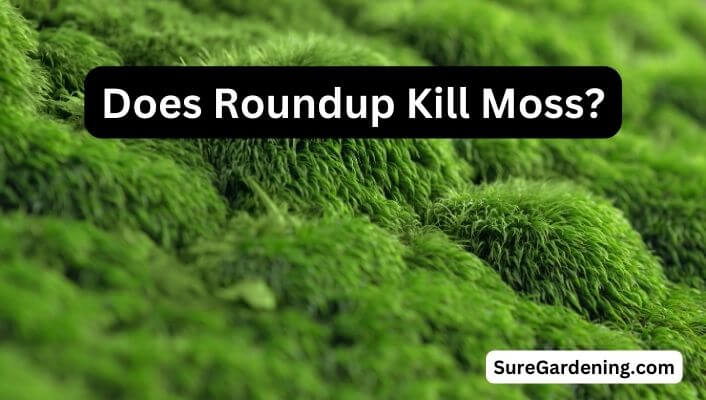When it comes to maintaining a lush and appealing lawn or garden, few things can be as frustrating as the continuous growth of moss. Plants like this are hardy and thrive in damp, shaded areas, making them a challenge for gardeners worldwide.
Hence, gardeners always try to find the right moss control solution. Many gardeners believe Roundup is a good moss control solution. So does Roundup kill moss?
Our comprehensive guide will explore Roundup’s moss-killing abilities and explore its impact on your garden’s beauty and health.
Post Contents
- Does Roundup Kill Moss? – Answered
- Understanding Moss and its Growth
- Roundup: An Overview
- Examining the Moss-Killing Myth
- The Truth about Roundup and Moss
- Alternative Moss Control Strategies
- Understanding Roundup’s Limitations
- Safety Considerations and Environmental Impact
- Best Practices for Moss Control
- Roundup for Other Uses
- FAQs About Moss & Roundup!
- Summary
- Author
Does Roundup Kill Moss? – Answered
No, the roundup does not kill moss. Roundup is a weed killer and does not target moss. Other products such as moss killers are specifically designed to target moss and other unwanted plants.
While Roundup is great for killing weeds, it doesn’t do the same for moss, which is a non-vascular plant without a root system, which means it can’t be killed the same way as weeds.

Roundup’s active ingredient, glyphosate, targets the enzymes involved in the growth of vascular plants, making it effective against weeds. However, since moss lacks these specific enzymes and relies on a different mode of growth, glyphosate does not have the same impact on moss.
Therefore, if your goal is to control moss growth, relying solely on Roundup might not be the most effective approach. Instead, consider exploring alternative methods specifically designed for moss control, such as manual removal, changing environmental conditions, or utilizing natural solutions.
To achieve the best results in managing moss, understanding its unique characteristics and employing tailored treatments will be crucial in maintaining a moss-free landscape.
Understanding Moss and its Growth
Before we tackle the Roundup myth, let’s understand moss and the conditions that promote its growth. Moss thrives in damp, shaded environments with compacted soil and poor drainage.
Lawns and areas with limited exposure to sunlight become vulnerable to moss colonization. While most may add charm to certain areas, an unchecked spread can turn into a frustrating eyesore.
Roundup: An Overview
Roundup, a widely used herbicide, gained popularity for its effectiveness in eradicating unwanted weeds and undesirable plants. Manufactured by Monsanto (now Bayer), it contains glyphosate as its active ingredient.
Home gardeners and landscapers often rely on Roundup to maintain weed-free gardens and pristine landscapes.
Examining the Moss-Killing Myth
Over the years, many have assumed that Roundup effectively kills moss, causing it to be considered as a reliable solution. The reality is very different from what the myth implies.
Despite its effectiveness on broadleaf weeds and grasses, Roundup is less effective on moss, which is explained by moss’ biological differences from typical plants.
The Truth about Roundup and Moss
Moss, unlike traditional plants, lacks the specific biological structures that make them susceptible to glyphosate—the active ingredient in Roundup.
This crucial difference means that Roundup’s mode of action, which inhibits an enzyme necessary for plant growth, has little to no effect on moss.
As a result, moss continues to thrive despite Roundup’s application, leaving gardeners puzzled and seeking alternative solutions.
Alternative Moss Control Strategies
If Roundup is not the answer, what other options do gardeners have for effective moss control? The good news is that there are several eco-friendly alternatives to tackle moss infestations.
Mechanical methods, such as manual removal or pressure washing, are particularly useful for small moss patches. It is also possible to deter moss growth by using natural ingredients such as vinegar or soap solutions without harming the environment.
Understanding Roundup’s Limitations
To prevent disappointment, it’s essential to understand the intended use of Roundup. The herbicide is primarily designed for weed control in agriculture and traditional gardening settings.
Using Roundup for moss control is not recommended, given its limited efficacy against this unique plant organism.
Safety Considerations and Environmental Impact
When using any herbicide, safety should be a top priority. Roundup, like any chemical product, should be handled with care, and users should follow safety guidelines to protect themselves, their pets, and the environment.
The proper application and storage of Roundup will help minimize its impact on non-target plants and wildlife.
Best Practices for Moss Control
For gardeners seeking to prevent moss infestations and maintain a healthy lawn, adopting a holistic approach to garden management is key. Proper lawn care practices, such as regular mowing, aeration, and overseeding, can create an environment less favorable for moss growth.
Well-maintained lawns with balanced soil conditions can outcompete moss and maintain their lush, green appearance.
Roundup for Other Uses
Here are some situations where Roundup shines and how it can be used effectively:
- Large Weed-Infested Areas: Roundup is particularly useful for managing weeds in large areas where manual removal would be labor-intensive and time-consuming. It can effectively control a wide range of common weeds, including annuals, perennials, and grasses.
- Weed Control in Paths and Driveways: It is common for weeds to grow in cracks and crevices of walkways and driveways. By applying Roundup to these areas, you can prevent weed growth and maintain weed-free surfaces.
- Clearing Overgrown Areas: In neglected or overgrown areas, where weeds and vegetation have taken over, Roundup can be used to clear the space before replanting or establishing a new garden. It provides an effective way to start with a clean slate.
- Preparing Garden Beds: Using Roundup to kill existing weeds is an effective way of preparing garden beds before planting new crops or flowers. It ensures that the new plants will be able to establish without the competition of persistent weeds.
- Controlling Tough Perennial Weeds: Some perennial weeds, like bindweed and Canada thistle, are challenging to eradicate manually due to their deep, extensive root systems. Roundup can be used to target these stubborn weeds and prevent them from regrowing.
- Spot Treatment: Instead of applying Roundup indiscriminately, it can be used as a spot treatment for specific weed-infested areas. This minimizes the impact on non-target plants and reduces overall chemical use.
- Managing Invasive Plants: Invasive plant species can quickly overtake native vegetation, disrupting the ecosystem balance. Roundup can be employed as part of an integrated approach to manage invasive plants and protect the biodiversity of the area.
When using Roundup or any herbicide, it’s essential to follow the manufacturer’s instructions carefully and take proper safety precautions. Consider using less toxic alternatives or manual weed removal when possible, especially in areas with desirable plants nearby.
FAQs About Moss & Roundup!
Can Roundup effectively kill moss in my lawn?
Roundup’s effectiveness against moss is limited due to the unique biological characteristics of moss. We recommend exploring alternative, eco-friendly methods for moss control.
Is Roundup safe to use in my garden?
When used as directed, Roundup is safe for garden use. However, it’s essential to follow safety guidelines to minimize risks to humans, pets, and the environment.
What are some eco-friendly alternatives to Roundup for moss control?
Vinegar and soap solutions, manual removal, and pressure washing are effective and environmentally friendly options for moss control.
Can a well-maintained lawn prevent moss growth?
Yes, maintaining a healthy lawn with proper aeration, mowing, and soil conditions can deter moss growth and promote a lush, green lawn.
Are there any natural remedies to prevent moss in my garden?
Yes, some natural remedies, such as using baking soda or diluted vinegar, can help deter moss growth without harmful chemicals.
Summary
In conclusion, the prevailing belief that Roundup kills moss is a myth. Moss lacks the biological targets that make Roundup effective against weeds.
For those seeking moss control, it is crucial to explore alternative, eco-friendly methods while embracing sustainable gardening practices.
By working in harmony with nature, gardeners can create beautiful, healthy landscapes while preserving the environment for future generations.
Read more useful articles about Moss:

